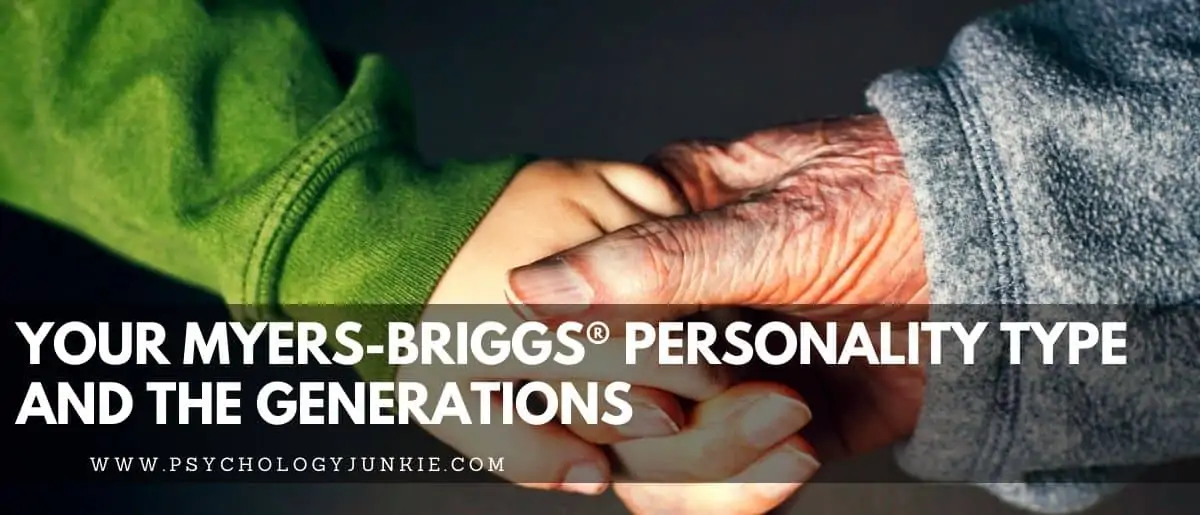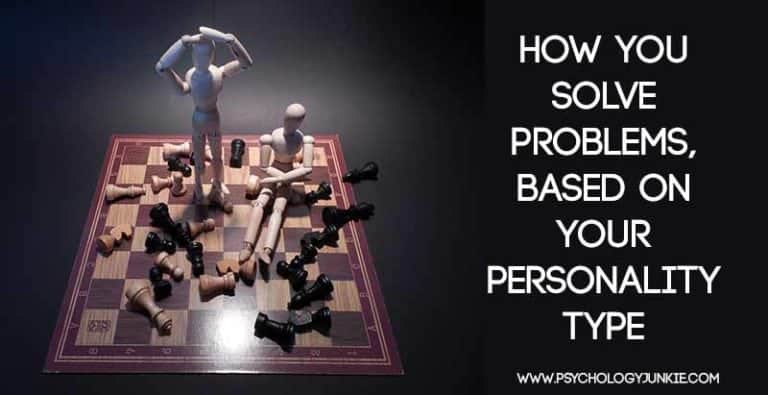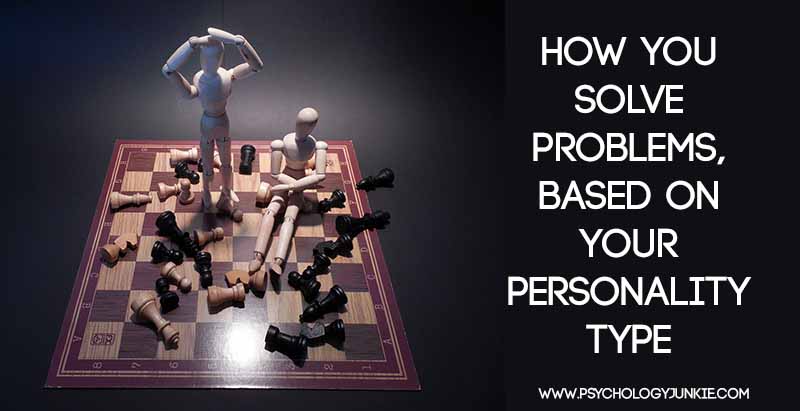Your Myers-Briggs® Personality Type and Your Generation
When it comes to your personality type, there are many things that influence how you show up in the world. If you are, for example, an INFP baby boomer, you may have different work desires than an INFP millennial. At the same time, different generations tend to appeal to different personality types for a variety of reasons. Today we’re looking at why certain types may fit more easily into one generation than another.
Disclaimer:

Just because you’re born as a Millennial, Boomer, or Gen-Xer, this doesn’t mean that you have all the characteristics naturally ascribed to that generation. This also doesn’t mean that if you’re a particular type you’re going to automatically have all the generational characteristics that I’m putting you with here. Some will likely fit, while others might be a little off the mark.
This article is primarily looking at the values, work desires, and overall characteristics of different generations and then finding connections between those and your personality type. Your upbringing, life experiences, and unique idiosyncrasies will make a huge difference in how you show up in the world.
Estimated reading time: 14 minutes
Which Generations Are We Looking At?
Today we’re going to look at five different generations: The Silent Generation (born between 1900-1945), The Baby Boomers (born between 1946-1964), Generation X (born 1965-1980), Millennials (born 1981-1997), and Generation Z (born 1997-2015).
As you learn more about these generations, you might find that you relate more to one generation than another based on your life experiences and personality. For example, you might be a millennial by birth, but relate more to the silent generation based on your values and desires.
The Silent Generation (born 1900-1945)
This generation was greatly shaped by the World Wars and the Great Depression. Because of various hardships, they learned to develop a strong work ethic and a steady resilience. Known for their traditional values, they believed in respecting authority, working hard, and making sacrifices for the greater good. Through the trials of the dust bowl and the Great Depression, they learned to value thriftiness and resourcefulness. This generation used things until they were completely worn out. No buying Amazon Prime 2-day delivery on a whim for these individuals! Fairness is highly valued by these traditionalists, and they believe that their own needs are of lesser importance than the needs of their nation and communities.
Summing up the characteristics of the silent generation:
- Adhere to rules
- Believe in contributing to the collective good
- Understand the value of delayed rewards
- Highly disciplined
- Value responsibility and strive to be dependable
- Believe in law and order
- Believe in duty before pleasure
- Unlikely to question authority
- Believe in doing more with less and abhor waste
- Emphasize respect and courtesy
- Patriotic
- Resilient and unlikely to give up in the face of hardship
- Want a clear chain of command and hierarchy in the workplace
- Prefer subtle, quiet recognition to flashy awards or “pomp and circumstance”
If you grew up in this generation, then chances are, you were shaped by the values and times you went through. Perceivers from this generation probably seemed more structured and routine-oriented than Perceivers from later generations. Sensing-Perceivers who tend to like flashy and exciting experiences were likely more frugal, cautious, and fiscally aware than average.
Overall, Sensing-Judgers are the types most likely to resemble The Silent Generation in their characteristics. Obviously, a millennial Sensing-Judger won’t have experienced the same life experiences as that of someone born in 1922, but they may have the same belief in duty, responsibility, frugality, and courtesy.
Types that are most likely to relate to The Silent Generation: ISTJs, ISFJs, ESTJs, and ESFJs.
The Baby Boomers (1946-1964)
While a lot of criticism is made about baby boomers, people born in this era have made many contributions to society as well. These individuals were born after the World Wars and, as a result, had a sense of optimism and hope at the beginning of their lives. As their lives continued, they experienced both difficult and promising transformations. The Civil Rights movement began during their lifespan, and from observing this, many baby boomers believed in fighting for equality and questioning established authority systems. Values that matter to baby boomers include equality, freedom from government interference, and loyalty to children. This is the generation that promoted political correctness and believed that they could literally change the world. The hippie movement and the Vietnam War coincided during their lifetimes to create skepticism and an anti-authoritarian bent. Many Boomers stopped believing that their country was the “American Dream” they were promised by their parents. While they tend to be anti-government and skeptical of authority, they also tend to respect the rules and structures of their workforces. This generation invented the 50 hour work week, and strived for monetary comfort and compensation for their efforts. They tend to be goal-focused and resourceful; enjoying charts, progress bars, and check-lists to ensure they’re staying on task.
Summing up the characteristics of the Baby Boomer generation:
- Independent and self-assured
- Follow the rules of the society, but will speak up if their values are violated
- Enjoy competition
- Want to surpass their peers
- Driven by self-improvement and personal growth
- Goal-focused
- Resourceful
- Detail-oriented
- Disciplined and structured
- Question authority
- Not afraid of confrontation
- Question everything
- Live to work
- Struggle to balance work/family life, with work usually taking precedence
- Crave monetary awards
The structured, hard-working mentality of baby boomers likely appealed to Thinking-Judging types. TJs enjoy a good schedule and, like Boomers, appreciate task lists and marking things off a chart. TJs also don’t mind critiquing or entering a conflict or debate when the need arises, especially as it pertains to their individual values.
If you grew up during the baby boomer era, you probably felt pressured to adopt Judger qualities rather than Perceiver ones. Working hard, going after clearly defined goals, and staying on task one thing at a time were prized during this generation. While feeling types might have appreciated the value-driven nature of many of the boomer beliefs, the competitive, “no-holds barred” confrontational nature of many boomers may have felt overwhelming.
Types that are most likely to relate to the Baby Boomer generation: ESTJs, ENTJs, INTJs, ISTJs.
Read this next: The Middle-Aged Versions of Every Myers-Briggs® Personality Type
Generation X (born 1965-1980)
Gen Xers tend to feel like the “forgotten middle child” of the generations. Sandwiched between the Baby Boomers and Millennials, they are often caught between bickering spats of Boomers and Millennials. Gen Xers experienced the rise of personal computing and are typically digitally savvy and curious. They are also highly independent, as many were latchkey kids growing up and were given a lot of autonomy. They were the last generation to freely ride their bikes in the neighborhood or roam the streets unsupervised until their parents called them in for supper.
Growing up as a Gen Xer often meant feeling disillusioned over the world. Unlike the Baby Boomers who were promised the American Dream, Gen Xers were skeptical of establishments and watched their politicians and presidents lie and cheat. Between the Watergate Scandal and the Vietnam War, they learned that no one in power could be trusted. As a result, they grew into anti-establishment critical thinkers and entrepreneurs. Gen Xers tend to excel at problem-solving and they dislike a lot of hand-holding professionally. They prefer employers that give it to them straight and cut past the fluff to give them direct, constructive criticism.
Unlike the Millennial generation, Gen Xers tended to take care of themselves and strived to overcome challenges on their own without outside support. This independent spirit gave them a desire for entrepreneurship and personal freedom. They transformed the workplace, questioning rules that they saw as unnecessary, like wearing suits to work or shuffling everyone into confining cubicles at the office. Working smarter, not harder, was their motto and they hated wasting time on bureaucracy. While the Boomer generation lived to work, Gen Xers worked to live. Rather than monetary rewards, these individuals craved freedom and time off.
Summing up the characteristics of Generation X:
- Digitally aware and anxious to learn
- Independent and self-sufficient
- Individualistic
- Value freedom and autonomy
- Prefer to overcome challenges on their own
- Perform best under minimal supervision
- Strong entrepreneurial spirit
- Like change and are adaptable
- Question cultural practices that seem irrelevant
- Think critically about the world around them
- Don’t care about social niceties
- Skeptical and cynical
- Think globally
- Suspicious of baby boomer values
The skeptical, innovative, flexible outlook of Gen X would have been especially appealing to Thinking-Perceiving types. They would have handled the autonomy of this generation well, and probably enjoyed the communication that lacked sugarcoating and needless “fluff.” I’ve also noticed that Intuitives, in general, particularly NTPs and INJs, seem to have an affinity for this generation. They probably enjoyed the disruption to tradition and skepticism that Gen X imbued.
If you were a Feeling-Judger growing up during the Gen X era, you may have adopted an attitude of not caring, even if you cared a great deal about many issues. Because being independent, detached, straightforward, and blunt was prized during this time and you may have felt pressure to act more unflappable and emotionally reserved than was natural for you.
Judgers, in general, may have felt a little overwhelmed by the more flexible, unstructured nature of Gen X. In the workforce, Judgers tend to like a lot of structure and routine. Gen Xers like things flexible and dislike much supervision or structure forced upon them. However, the workplace during this time period was still largely run by Baby Boomers or Silent Generation folks, so Judgers still may have had the upper-hand in finding a workplace that catered to them.
Types that are most likely to relate to Generation X: ENTP, INTP, ESTP, ISTP, INTJ, ENTJ, INFJs, ENFPs.
Millennials (1981-1997)
Millennials are idealists in every sense of the world. This is the generation that grew up witnessing the recession, terrorist attacks, 9/11, school shootings, and the war in Iraq. They are also a generation raised in the digital world. Social media and the use of Smartphones have made the world smaller and more connected than ever before. Being able to communicate globally with others has made Millennials highly aware of problems facing people in many areas of the world. This instilled in them the desire to make a difference and right the wrongs of corrupt authorities. Making a positive difference in the world is crucial to Millennials. In fact, they are more likely to give to charity than other generations, with 84 percent of millennial employees giving to causes they believe in.
While people like to mock Millennials for being entitled and me-focused, they carry a tremendous emotional weight for the problems people face worldwide. They value being conscience-driven, tolerant, spiritual, creative, and free-thinking and this plays out in their spending as well as their work lives. Millennials are loyal to brands that align with them on their values and appreciate brands that are socially active and demonstrate their beliefs. When it comes to the workplace, while Boomers lived to work and Gen X worked to live, Millennials have melded the two. They see work and life as being inextricably linked and thus crave careers that allow them to grow personally and support values they believe in.
While Gen Xers were often left to their own devices growing up, Millennials often had sheltering and involved parents. This has had both positive and negative effects: Millennials are more likely to want hand-holding in their careers, which can have negative effects, but they also tend to have stronger relationships with their parents and a desire to learn and be mentored by their superiors in the workplace.
Summing up the characteristics of Millennials:
- Charitable and conscience-driven
- Slower to get married and have children than previous generations
- Tech-savvy
- Flexible
- Prioritize family over work
- Crave meaningful work that aligns with their values
- Crave frequent feedback and guidance
- Team-oriented and collaborative
- Desire frequent praise and reassurance
- Achievement oriented
- Want life to be fun and prioritize experiences over things
- Consider themselves spiritual, but not affiliated with organized religion
- Want to be evaluated by the end result, not how they got it done or the time it took
- Value mentorship
- Have a passion for learning
If you were a Thinking type growing up in the Millennial era, you may have developed the feeling side of your personality more fully. Feeling values were honored more during this time than in previous generations, with there being a focus on being “nice,” and collaborating with others and their various values. Thinking-Judging types may have felt a little irritated by their fellow Millennials, wondering why there wasn’t more structure, independent drive, and focus on timelines and measurable results.
Sensing types may also have felt slightly out of their element during the Millennial generation. Their pragmatic, detail-oriented nature is more akin to the silent generation or Gen Z than the Millennial time period. Millennial culture focused on dreamers and idealists more than doers and pragmatists.
Types that are more likely to relate to Millennials: ENFPs, INFPs, ENFJs, INFJs, ESFPs, ISFPs
Generation Z (1997-2015)
Gen Zers are a tech-savvy, innovative generation that seek success, meaning, and security. They’ve grown up with terrorism, climate change issues, a global pandemic, and school shootings frequently on their minds. That and being raised by Gen Xers for the most part, has given Gen Z a steelier, more skeptical outlook than most Millennials will have. They have been taught to be more independent and able to figure things out for themselves. While Millennials are the consummate Idealists, Gen Zers are more pragmatic. They grew up during a recession and have been shaped by the economic pressure that was prevalent during their formative years. Thus, they are concerned with making wise investments and long-term decisions. Among those saving for retirement, average Generation Zers started saving at 19, while Millennials started at 25, Gen X at 30, and Baby Boomers at 35. They are typically more conservative in their spending than other generations and are wary of their money running out.
As true digital natives, Gen Zers have grown up in a connected information age. They have little to no memory of a world before smartphones, and they like to stay connected to issues affecting people around the globe. They are more racially diverse than other generations and more accepting of same-sex marriage and gender fluidity, with one-third knowing someone who prefers to use gender-neutral pronouns. These individuals pride themselves on being inclusive, authentic, and ambitious.
While Gen Zers tend to be more direct and independent than Millennials, they also share the same drive to support their values. They care deeply about issues of racial equality, ending poverty, improving the environment, and helping the homeless. They want to work for responsible companies that actually care about the world and want to make a positive impact.
Summing up the characteristics of Generation Z:
- Fiscally conservative and frugal
- Want to save for retirement
- Focused on racial and gender equality
- Flexible and deal well with change
- Skeptical and straight shooting
- Competitive
- Dislike a lot of structure and scheduling
- Prefer small companies to large ones
- Want to work smarter rather than harder
- Skeptical of influencers and marketing, look for truth and authenticity
- Determined not to be in debt
- Driven to freelance or entrepreneurial work
- Want remote work options
- More likely to self-educate and find alternate ways to learn than go the traditional route
- Aren’t afraid of job-hopping
- Self-aware
- Self-reliant
- Innovative
- Politically progressive
- Drawn to sustainable products and brands
If you grew up as a Judger during the Generation Z period you may have taken on more Perceiver tendencies. This generation is flexible and knows the world is constantly changing and transforming. They like innovation, change, and adapting to novel situations. Judgers growing up during this generation may feel a little off kilter as they try to keep up with the many changes being hurled their way, but many also adapt and thrive. Thus a Gen Z Judger likely appears more flexible, unstructured, and free-spirited than a Baby Boomer or Silent Generation Judger.
Gen Zers are also known to be more direct and straightforward in their speech. While Millennials are touted by many to be the “nice” generation, Gen Zers don’t like to waste time with niceties and would rather get straight to the point. Anything that seems cloying, manipulative, or effusive they can be skeptical of. My thoughts are that, all things combined, Sensing-Thinking-Perceivers would do well in this generation because of their no-frills, casual, flexible, pragmatic, and straightforward approach to life. Feeling-Perceivers may also do well because of the focus on authenticity, inclusion, and intrinsic, individual values.
Feeling-Judger types may have the most difficult time in a Gen Z world. They do best when they can read people in a face-to-face, personal way. Because so much of Gen Z’s interactions are digital, they rely excessively on the use of emojis to try to communicate or “read” others in their sphere. However, FJs miss out on the ability to get a sense of someone’s emotional state in a real-time, personal way, and that can create a lot of stress for them. Feeling-Judgers, especially EFJs, crave interconnectivity in real time. They thrive when they can immediately have a back-and-forth with others and adapt and sense other people’s moods and feelings and respond in turn. Waiting on the other end of a smartphone for someone to carefully formulate their response can be maddening for the Feeling-Judger, who wants to know how someone feels in a more immediate, personal way.
Types that are more likely to relate to Generation Zers: ISTPs, ESTPs, INTPs, ENTPs, INFPs, ISFPs, ENFPs.
Other Articles You Might Enjoy:
Family Dysfunction and Your Personality Type
The Most to Least Rebellious Myers-Briggs® Personality Types
The Leadership Styles of Every Myers-Briggs® Personality Type
What Are Your Thoughts?
Do you agree or disagree with this article? Do you have any insights or stories to share? Let us know in the comments!
Find out more about your personality type in our eBooks, Discovering You: Unlocking the Power of Personality Type, The INFJ – Understanding the Mystic, The INTJ – Understanding the Strategist, and The INFP – Understanding the Dreamer. You can also connect with me via Facebook, Instagram, or Twitter!
Sources:
Generation X Professional Characteristics
Generation X: History and Characteristics
These are the 5 Main Generation X Characteristics You See in the Workplace
Why Gen Z Kids Play a Bigger Role in Family Buying
Millennials: The Me, Me, Me Generation
More Millennials Donated Money During the Pandemic Than Other Generations
How Millennials Are Changing Philanthropy
How Gen Z May Change Workplace Communication for Good
Generation Z Employee Research
Characteristics of the Silent Generation
Generational Differences Chart
8 Important Characteristics of Baby Boomers
Characteristics of “Baby Boomer” Professionals

Subscribe to Our Newsletter

Want to discover more about personality type? Get the inside scoop with Susan Storm on all things typological, along with special subscriber freebies, and discounts on new eBooks and courses! Join our newsletter today!














This is great! Very relatable. My husband and I are both Gen X and fit: INFJ and ISTP. My daughter and son were born in 1995 and 1996 at the very end of the Millennial age group, and are INFP and ENFJ. My ENFJ son fits much more closely with the Gen Z values, though. He’s a varied entrepreneur with a strong emphasis on being debt-free and saving. He’s also pretty blunt, and does well on his stream, where he can interact with people in real time. My daughter is much more idealistic and artistic, fitting in with Millennial and INFP. She MUCH prefers being behind the scenes and loves to create.
Susan, this is one of your best posts to date. Incredibly useful observations here.
honestly, this makes a lot of sense, my mom is an ENTP gen x and I’m a ENFP gen z
I am an INTJ woman and though I was born in 1960, I identify with Generation X and definitely not Baby Boomers
It’s kind of like that with me. My personality type (INTP) doesn’t match with a typical Millennial’s even though I was born in the late 1980s. I’m more like an Xer.
Amazing post just in general! Really contributes so much understanding of people and generations. I’m not sure if it’s true world wide or just for Americans/Westerners though.
I’m a Millenials INFJ 5w4 and personally see myself as taking on the qualities of the generations I’ve lived through and grew up around. From Gen X, Millenials and just a dash of Gen Z. That all said, I had children young, and the kids seem to be more Gen Alpha than Gen Z. They don’t seem to share the values of Gen Z and perhaps it’s because they were raised by a Millenial instead of a Gen X’er 🤔
This is accurate for me being born in a Gen Z as an INTJ girl born in this generation having the traits of a P, so probably that’s one of the reason why I switch between J and P.
I’m not sure why my comment wasn’t published, but I’ll try again:
As an INTP born during the late 1980s, I’m more similar to an Xer than a typical Millennial.
I guess my initial comment was posted after all. This can be ignored.
Your previous comment was actually published 😉
Typical. Slap a label in a group of people, and they are all supposed to fall into their collective. Yuk
Being an INFJ Gen Zer is so hard, and the fact that the pandemic forced us to be strictly online did not help! I always look for videos when I can, to help get a better understanding on tones and body language when people are having discussions.
I also feel as though I’m a nice big mix of Gen X, Millenials, and Gen Z, given the right circumstances.
Great article here. The generational profiles ring true. Thanks for this new insight.